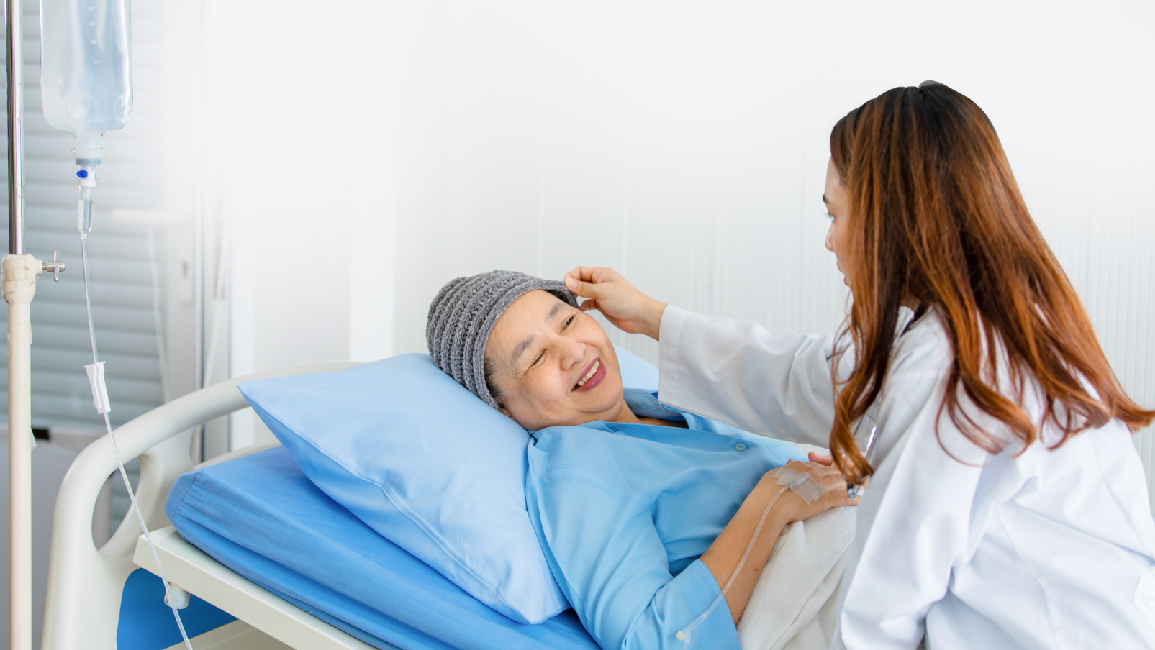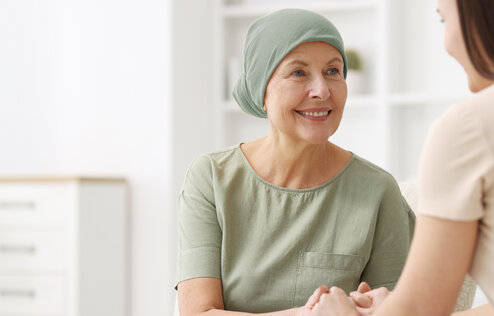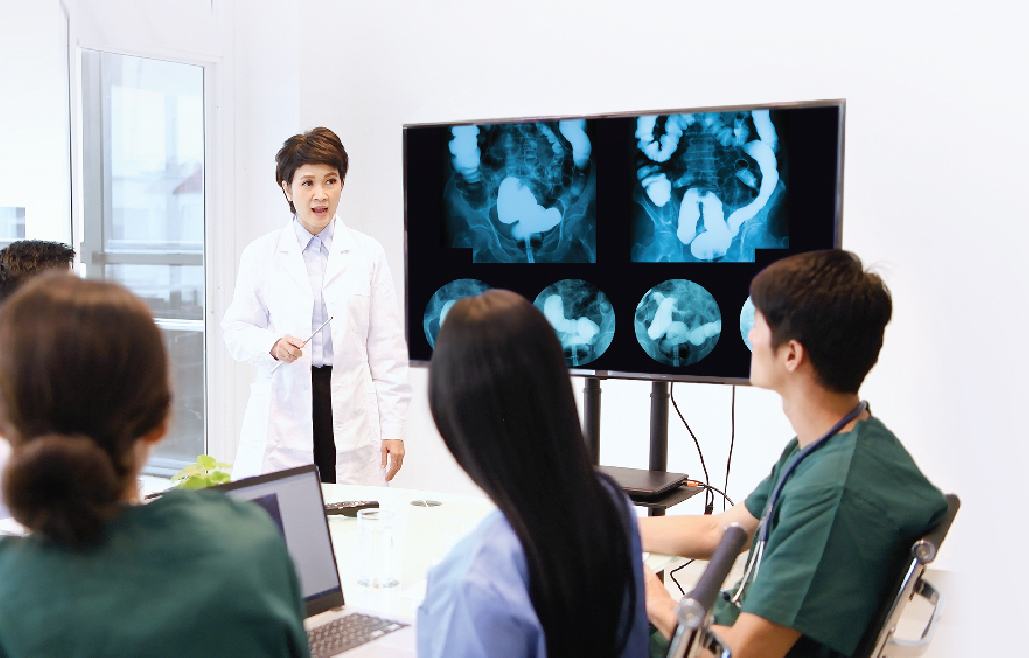Chemotherapy : Cancer Treatment with Personalized Care
Center : Cancer Center
Article by : Dr. Kittipong Udomdamrongkul
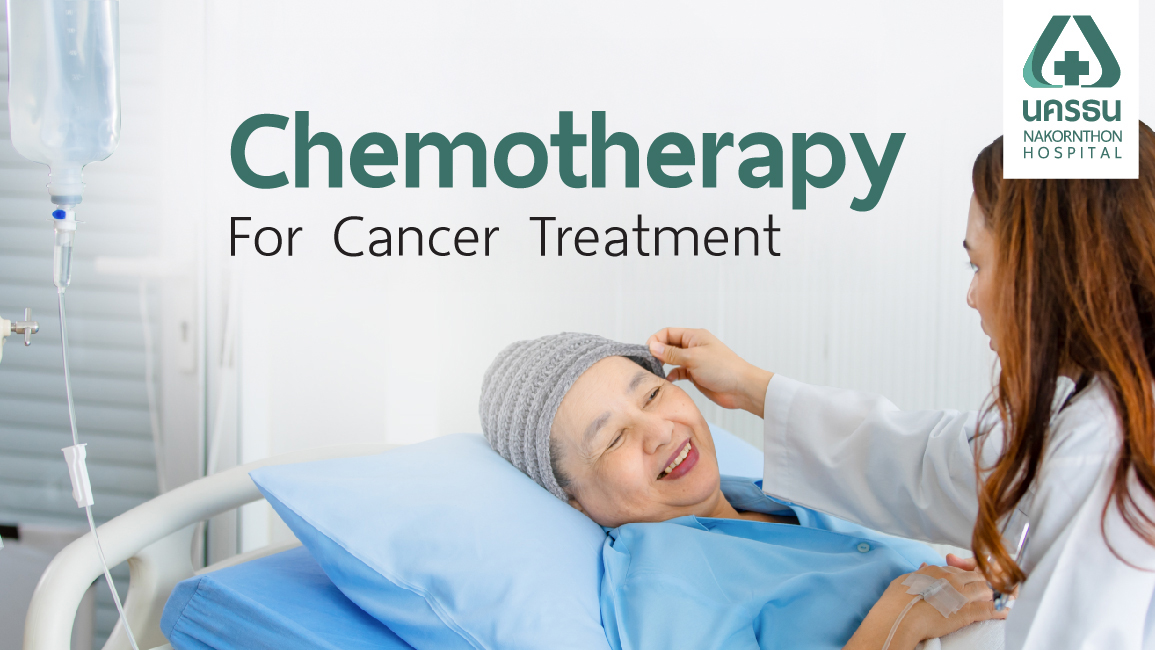
Cancer treatment today involves various methods, depending on the type and severity of the disease. One of the most well-known treatments is chemotherapy, which is currently the most widely used form of drug-based cancer treatment.
Doctors may use chemotherapy as the primary treatment on its own or combine it with other therapies such as targeted therapy or immunotherapy to enhance treatment outcomes. The goal is to increase the chances of a complete cure, beyond what localized treatments alone can achieve.
At Nakornthon Hospital Cancer Center, our team of specialized doctors places great emphasis on both treatment effectiveness and the quality of life of each patient. A multidisciplinary team collaborates to design a personalized treatment plan for every patient. Patients and their families receive guidance and consultation on possible treatment options before making any decisions.
Table of Contents
- What is Chemotherapy?
- How is chemotherapy given?
- Types of Chemotherapy Administration
- What types of Chemotherapy drugs?
- How long does Chemotherapy take?
- Procedure of Chemotherapy Treatment
- Preparations before Chemotherapy
- Self-care during Chemotherapy treatment
- What to do at home after Chemotherapy treatment
- Can cancer be cured with Chemotherapy?
- What are the side effects of Chemotherapy?
- Chemotherapy for Cancer Treatment at Nakornthon Hospital
- Free Online Consultation with a Specialist
What is Chemotherapy?
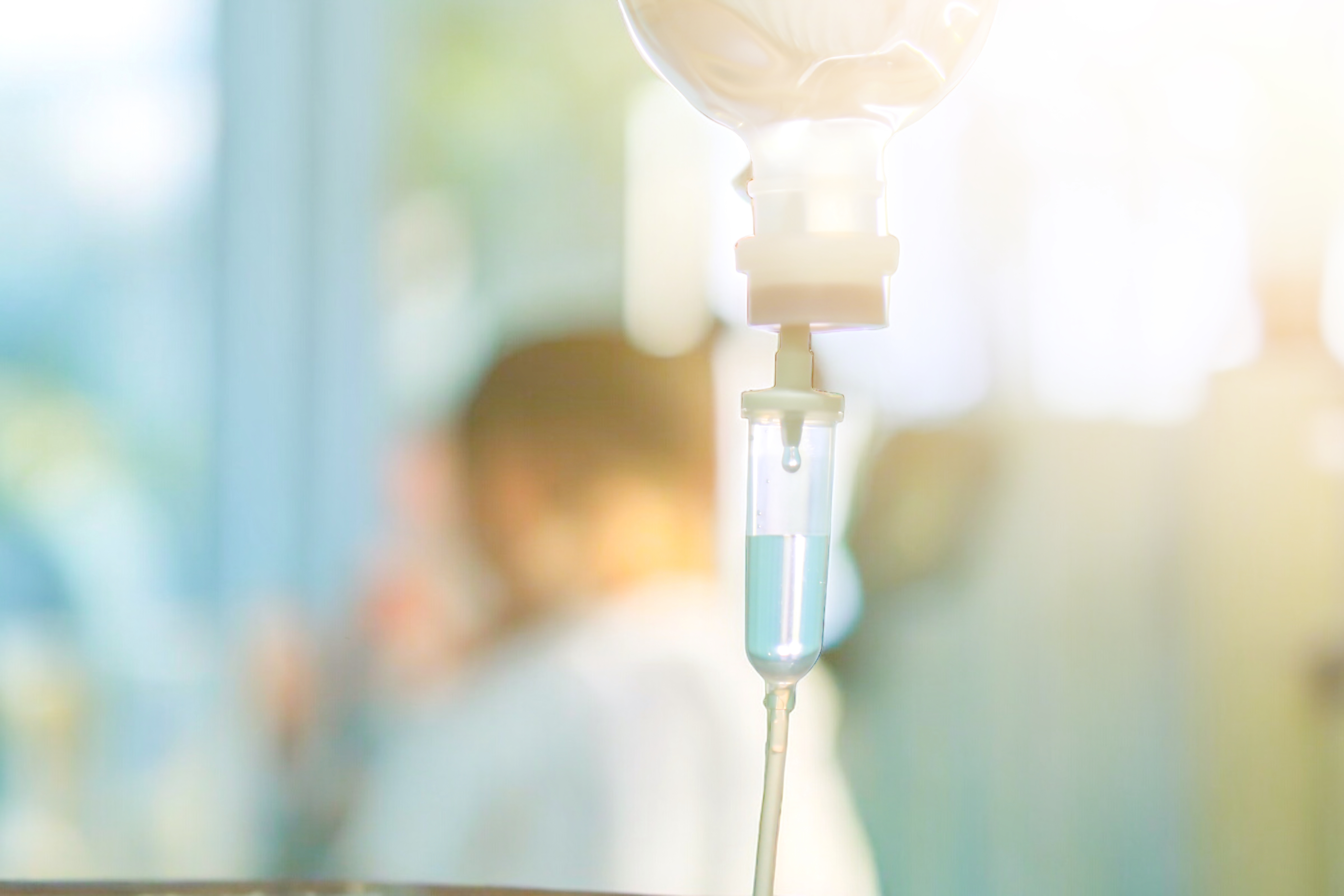

Chemotherapy is a form of systemic therapy, meaning the drugs circulate throughout the entire body to fight or destroy cancer cells. These drugs target rapidly dividing cells, which is a key characteristic of cancer cells. Chemotherapy works by interrupting the process of cell division in multiple ways, ultimately preventing cancer cells from continuing to divide and causing them to die.
However, chemotherapy also affects normal cells in the body that divide quickly, such as hair follicles, the lining of the mouth, and bone marrow. As a result, patients undergoing chemotherapy may experience side effects such as hair loss and mouth sores.
Thanks to advancements in modern medicine, today’s chemotherapy drugs are more effective and have fewer side effects, especially when administered under the care of experienced specialists.
How is chemotherapy given?
Doctors may use medications for different objectives—curative, controlling, or palliative—depending on the patient’s condition. Details are as follows:
- As an adjunct to localized treatment, with the goal of curing cancer, such as:
- Administered after surgery to prevent cancer recurrence.
- Administered before surgery to shrink the tumor, limit its spread, and increase the chances of successful surgery.
- Administered along with radiation therapy in cases where surgery is difficult—for example, in cancers located in the nasopharynx.
- For palliative purposes, chemotherapy can help relieve symptoms, extend survival, and improve the quality of life in patients with advanced-stage cancer.
In some cancer patients, doctors may choose to use a single drug, but more commonly, two or more drugs are combined or used alongside other treatments—such as chemotherapy before and after surgery, or in combination with radiation therapy.
The type and number of drugs a patient receives depend on several factors: the type of cancer cells, the stage or severity of the disease, and whether the cancer has spread to other organs. The ultimate goal of chemotherapy is to enhance the effectiveness of treatment beyond what localized therapy alone can achieve.
Types of Chemotherapy Administration


Chemotherapy, commonly known as “chemo,” can be administered in various ways depending on the type of cancer, the location of the tumor, and the patient’s physical condition. The methods of administration are classified based on how the drug is delivered into the body, as outlined below:
Oral Chemotherapy
Oral chemotherapy comes in the form of pills or capsules, offering a convenient method of administration. However, it must be taken strictly as prescribed by a doctor. This method allows for greater flexibility and can reduce the need for hospital visits.
Intravenous Chemotherapy
Intravenous chemotherapy (IV Chemo) is the most commonly used method. The drug is injected directly into the bloodstream through a vein. It can be administered in several ways, such as direct IV injection, through a catheter, or via a central port.
Intra-arterial Chemotherapy
Intra-arterial chemotherapy (IA Chemo) involves injecting the drug directly into an artery that supplies blood to the tumor. This method is suitable for localized cancers, such as liver cancer.
Intraperitoneal Chemotherapy
Intraperitoneal chemotherapy (IP Chemo) is used to treat cancers that have spread within the abdominal cavity. The drug is delivered directly into the peritoneal space, allowing it to penetrate cancer cells lining the abdominal cavity. It is commonly used for advanced ovarian cancer or peritoneal carcinomatosis.
Topical Chemotherapy
Topical chemotherapy is applied externally in the form of creams or ointments. It is used for certain types of skin cancer, such as basal cell carcinoma, and for precancerous skin conditions like actinic keratosis.
What types of Chemotherapy drugs?
Chemotherapy comprises various classes of drugs, each with a distinct mechanism of action. The main categories include:
- Alkylating Agents : These drugs bind directly to the DNA of cancer cells, preventing them from dividing and ultimately causing cell death. They are used to treat many types of cancer, including lung cancer, leukemia, lymphoma, breast cancer, and ovarian cancer.
- Antimetabolites : These interfere with enzymes involved in DNA and RNA synthesis, which are essential for cancer cell growth. They are commonly used for cancers such as colon cancer, breast cancer, and leukemia.
- Antitumor Antibioticsb : Derived from microorganisms, these drugs work by damaging the DNA of cancer cells. They are used to treat cancers such as lymphoma, breast cancer, and lung cancer.
- Plant Alkaloids : Extracted from plants, these drugs inhibit cell division in cancer cells. They are effective for treating various cancers such as lung cancer, breast cancer, and lymphoma.

How long does Chemotherapy take?
The duration of a chemotherapy session typically ranges from 30 minutes to several hours, depending on the type of cancer, the stage of the disease, and the specific drug regimen being used. Treatment is usually delivered in cycles, each lasting about 1 to 5 days, with intervals of 2 to 4 weeks between cycles. On average, a patient may undergo 6 to 8 cycles, depending on the treatment plan prescribed by the doctor. It is important for patients to attend every scheduled session to ensure optimal treatment outcomes.
Procedure of Chemotherapy Treatment


The chemotherapy treatment process typically includes the following steps:
- Diagnosis and Planning : The doctor performs a thorough evaluation to determine the type and stage of cancer, then develops a personalized treatment plan based on the cancer type, the patient’s overall health, and other relevant factors. Patients are also informed about the chemotherapy process and potential side effects.
- Pre-Treatment Health Check : Before starting chemotherapy, patients undergo a health assessment that may include blood tests and an electrocardiogram (ECG).
- Drug Administration : Chemotherapy drugs can be administered in various ways, such as intravenous infusion, which usually takes 30 minutes to 6 hours, or orally, in pill or capsule form, depending on the prescription. The duration and method of administration depend on the specific drug and treatment plan.
- Post-Treatment Monitoring and Adjustment : After each cycle, the doctor evaluates how well the cancer is responding to the treatment. If the patient is recovering well, the next round may begin in 2–3 weeks. In case of severe side effects, the dosage may be adjusted, or the chemotherapy regimen may be changed.
Throughout the treatment, doctors carefully determine the dosage and whether to use a single agent or a combination of drugs, with the goal of achieving the most effective therapeutic outcome.
Preparations before Chemotherapy
The doctor will assess the patient’s overall readiness and conduct blood tests to evaluate blood cell counts, liver function, and kidney function. This process is essential because chemotherapy can suppress bone marrow activity, potentially leading to low blood cell counts. Some chemotherapy drugs also require dose adjustment based on liver or kidney function.
- Patients with pre-existing conditions such as heart disease, diabetes, high blood pressure, or those taking regular medications must inform the doctor beforehand.
- Eat a balanced diet with all five food groups, focusing on high-protein foods like meat, egg whites, and milk.
- Get adequate rest, including an additional 1–2 hours of daytime naps.
- Avoid alcohol, smoking, and herbal supplements.
Self-care during Chemotherapy treatment
- Monitor the injection site carefully. If you feel pain, swelling, redness, or suspect leakage of the drug outside the vein, notify a nurse immediately.
- Drink plenty of water to help flush out any remaining chemotherapy substances through your urine.
- If you experience nausea or vomiting, inform the medical team right away.
What to do at home after Chemotherapy treatment
- Follow your doctor’s instructions closely for at least one month after treatment to minimize the risk of complications.
- Seek immediate medical attention before your next scheduled appointment if you experience:
- High fever
- Severe nausea or vomiting
- Severe diarrhea
- Unexplained bruising or bleeding
- Bleeding from any part of the body
If there are no unusual symptoms, continue to attend follow-up appointments regularly as scheduled.
Can cancer be cured with Chemotherapy?
Chemotherapy is an effective cancer treatment that works by destroying rapidly dividing cancer cells. It interferes with the cell division process, eventually causing the cancer cells to die. In certain types of cancer, the cancer cells are highly sensitive to chemotherapy, making it possible to eliminate them completely and achieve a full cure.
In many cases, chemotherapy is used in combination with other treatments such as surgery, radiation therapy, immunotherapy, or targeted therapy. This integrated treatment approach helps increase the chances of completely eradicating cancer cells and preventing recurrence.
What are the side effects of Chemotherapy?
Because chemotherapy can also affect normal cells in the body that divide rapidly, it may cause chemotherapy side effects. These side effects vary from person to person depending on the type of chemotherapy regimen, the dosage received, and the individual’s overall health prior to treatment. Common side effects of chemotherapy may include:
- Hair loss
- Mouth sores or inflammation of the oral mucosa
- Loss of appetite
- Diarrhea
- Fatigue
- Anemia
- Low blood cell counts
However, most of these chemotherapy side effects are temporary. Once the effects of the medication wear off, these symptoms will gradually improve and return to normal. If any symptoms become severe or persist, it's important to consult a doctor immediately.
Chemotherapy for Cancer Treatment at Nakornthon Hospital
Cancer treatment through chemotherapy is one of the key services offered at Nakornthon Hospital’s Horizon Cancer Center. Thanks to ongoing medical advancements, modern chemotherapy drugs now offer greater treatment efficacy and fewer side effects compared to earlier generations. In addition, there are now supportive medications available to help prevent or minimize adverse reactions, improving patients’ comfort and overall outcomes during treatment.
At Nakornthon Hospital, chemotherapy is not just about administering medication. Our multidisciplinary team includes specialist physicians across various fields who work closely together to manage both the disease and its side effects in a personalized and comprehensive manner. This collaborative approach enables patients to undergo treatment with confidence, increasing the chances of success and enhancing their quality of life throughout the cancer journey.
For more information, please contact:
- - Website : https://en.nakornthon.com
- - Facebook : Nakornthon Hospital - International Patient
- - Line : @nakornthoninter
- - Tel: 02-450-9999 (Available 24 hours)
Free Online Consultation
Article of Cancer Center



